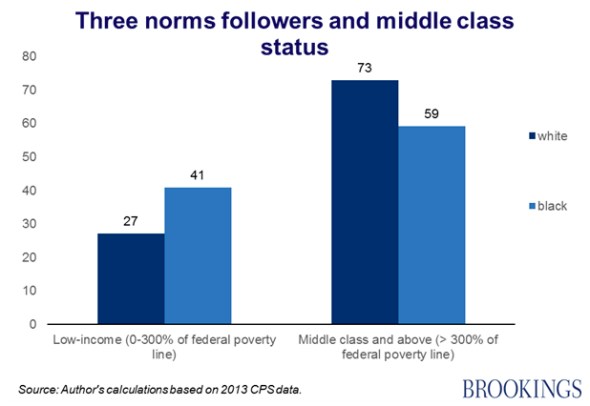A couple of weeks ago, I wrote about how some conservatives have become very fond of an idea known as the “success sequence.” This is the observation that Americans who graduate high school, find full-time work, and wait to have children until they are at least 21 years old and married very rarely end up poor. When they popularized this notion years ago, Brookings researchers Ron Haskins and Isabel Sawhill reported that only 2 percent of adults who followed all three of these “norms,” as they called them, lived in poverty. Nearly three-quarters of those who hit all three marks made it to the middle class, which they defined as earning more than 300 percent of the poverty line.
There is a lot to dislike about this meme. First, although Sawhill (who’s basically a moderate) and Haskins have tried to build a fairly involved policy platform around their concept, right-wing thinkers like the National Review’s Rich Lowry seem to take it as an excuse to simply demand more personal responsibility from struggling families. More fundamentally, the success sequence just isn’t that strong of an insight. Graduating from high school is good for one’s career prospects, you say? I’m shocked. Now let’s go back to the raging argument about how to improve American education. A full-time job will keep you out of poverty? Well I’ll be damned. Now how do we push the economy back to full employment again? Getting hitched before having kids is generally a smart move? Even if you agree (and some on the left are more skeptical than I am about how much this issue actually matters), we don’t really know how to promote marriage and live in a country where, laughably, providing women with affordable contraception is considered controversial.1
Beyond all this, there’s another reason to doubt the mystical powers of the success sequence: It seems to work a whole lot better for whites than it does for blacks.
That point is summed up in the chart below, which comes from Brookings researchers Richard Reeves, Edward Rodrigue, and Alex Gold. Of white people who followed all three norms2 in 2013, 73 percent qualified as middle class, compared with just 59 percent of blacks.

The economy also seems to be a lot more forgiving to whites when they miss one step in the sequence. For instance, 34 percent of white people manage to earn higher than 300 percent of the poverty line despite having a child while young or out of wedlock, compared with 23 percent of black people.
It’s important to recognize the fact that black families often end up stuck with a low income even when they do all the things conservatives would like, because it helps undercut the widespread delusion that, despite decades of entrenched institutional racism in this country, the only thing the black community lacks for is effort. It should also make writers like Lowry a bit more hesitant to bring up the success sequence as the key to all of black America’s woes. Because, in the end, it doesn’t really guarantee success.
1When it comes to avoiding poverty, finding full-time work really is most of the ballgame. Matt Bruenig has some of the math at Demos. But here’s a simple way to think about it. The poverty threshold for a family of three is $20,090 this year. That’s roughly the equivalent of working 40 hours per week for $10 per hour (the census measures poverty based on pretax income, as do some federal programs), slightly less than the average wage for a 17- to 20-year-old high-school grad. Of course, you can argue that being a single parent makes it harder to work full-time. But then that’s something we could address lots of ways, for instance by making child care more accessible.
2The phrase “norms” is kind of strange here. Keeping your pants on in public is a “norm,” in that it’s a social expectation easily achieved through basic force of will. Graduating high school or finding a full-time job is an accomplishment that can be deeply challenging to achieve if you grow up poor.
